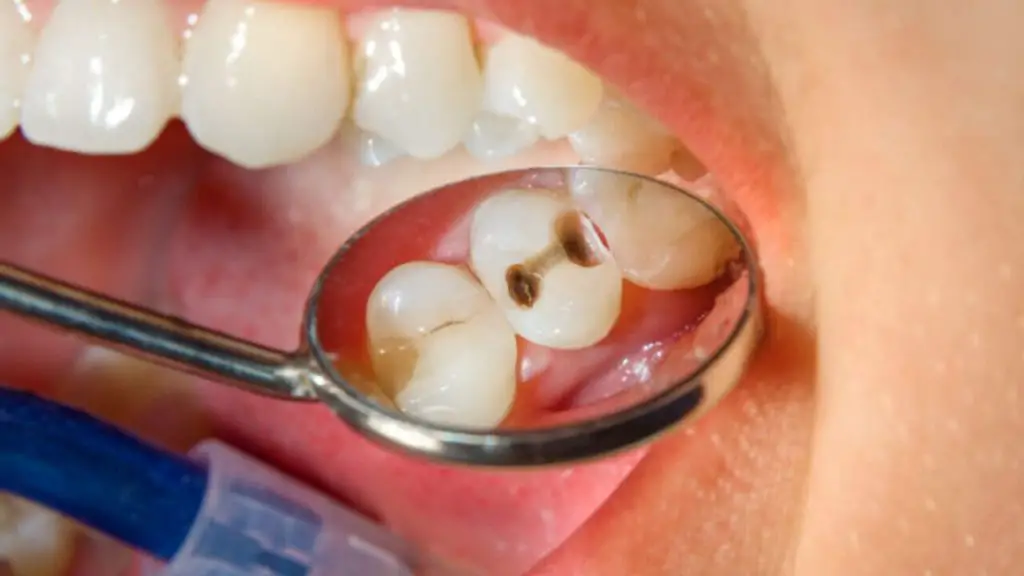Do you know what does a cavity feel like? Many people don’t, because they’re scared to find out. But it’s important to know so you can catch any problems early.
Toothache is the most common symptom of a cavity, but there are other signs to look for, too. Here’s what you need to know about cavities and how to spot them!
What Is A Cavity And What Are Its Causes?

A cavity is a small hole that forms in your teeth. When you eat sugary or acidic foods, the bacteria in your mouth produce acids that eat away at your enamel, the hard outer layer of your teeth. Cavities happen when plaque builds up on your teeth and starts to break down the enamel, or the hard outer layer of your teeth.
Plaque is a sticky film of bacteria, saliva, and food particles. When plaque isn’t removed, it can turn into tartar, which is harder to remove and can cause more damage to your teeth. Cavities are one of the most common dental problems, and they can happen at any age.
The best way to prevent cavities is to practice good oral hygiene, which includes brushing twice a day, flossing daily, and visiting your dentist regularly. If you already have a cavity, your dentist will likely recommend a filling or a crown to restore your tooth.
What Does A Cavity Feel Like?
A cavity feels like a small hole in your tooth. It can also feel like your tooth is sensitive to hot or cold temperatures, sweet foods, or pressure. If you have a cavity, you may also notice that your tooth looks darker than it used to. This is because the decay has reached the inner part of your tooth, called the pulp.
The pulp is full of blood vessels and nerves, which can become infected if the decay is not treated. Cavities are caused by bacteria that live in your mouth and produce acid. This acid breaks down the enamel or outer layer of your tooth. If the decay is not treated, it can continue to spread and damage the dentin, or inner layer of your tooth.
In severe cases, the decay can reach the pulp and cause an infection. Treatment for a cavity involves removing the decay and restoring the damaged tooth with a filling or crown.
How Can You Tell If You Have A Cavity?
Dental cavities are often referred to as “holes” in your teeth. Cavities happen when bacteria in your mouth form plaque, which is a sticky film that clings to your teeth. The acids in plaque eat away at your tooth enamel, causing cavities.
You may not notice cavities in their early stages, but as they progress, you may experience sensitivity to hot and cold foods or drinks, sweet foods, or pain when you bite down.
If you suspect you have a cavity, it’s important to see your dentist right away. only a professional can diagnose a cavity and determine the best course of treatment.
Are There Any Ways To Prevent Cavities From Forming In The First Place?
Yes, there are definitely ways that you can prevent cavities from forming in the first place! One of the best things that you can do is to make sure that you’re brushing your teeth twice a day with fluoride toothpaste. You should also be flossing every day to remove any plaque or food debris that might be caught between your teeth.
In addition, it’s a good idea to limit your intake of sugary snacks and drinks, as they can contribute to the development of cavities.
Finally, be sure to visit your dentist regularly for professional cleanings and checkups. Following these simple tips can help keep your teeth healthy and cavity-free!
How Much Does It Cost To Get A Cavity Filled?
There’s no denying that dental work can be pricey. But how much does it really cost to get a cavity filled? The answer may surprise you.
On average, a dental filling will cost anywhere from $50 to $200. The price will depend on the size of the cavity, the type of filling used, and the dentist you visit. For example, a small cavity can be filled with a composite filling for as little as $50. However, a large cavity may require an amalgam filling, which can cost up to $200.
So, what’s the best way to save money on dental fillings? The best bet is to visit a dentist who offers discounts for cash payments. Additionally, many dental insurance plans cover at least some of the cost of dental fillings. So, if you have insurance, be sure to check your coverage before scheduling an appointment.
Can A Cavity Heal On Its Own?
Many people believe that cavities can heal on their own, but this is unfortunately not the case. Once tooth decay has set in, it can only be removed by a dentist. However, there are some things that you can do to prevent cavities from forming in the first place.
For instance, brushing and flossing regularly helps to remove plaque, which is a sticky film that contains bacteria. If plaque is not removed, it can harden into tartar, which is much more difficult to remove.
In addition, eating a balanced diet and avoiding sugary snacks can help to keep your teeth healthy. By taking these simple steps, you can help to prevent cavities from forming.
When Is It Too Late To Reverse A Cavity?
The answer depends on the severity of the damage. If the cavity is small and only affects the enamel, it can often be reversed with simple changes to your oral hygiene routine.
However, if the cavity has progressed to the next layer of the tooth (dentin), it will likely require more extensive treatment, such as a filling or crown. In short, it’s best to take action as soon as you notice a cavity forming. The sooner you address the problem, the easier it will be to reverse.
Additional Contents


